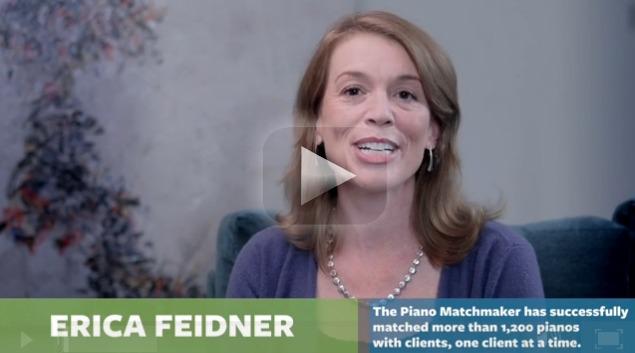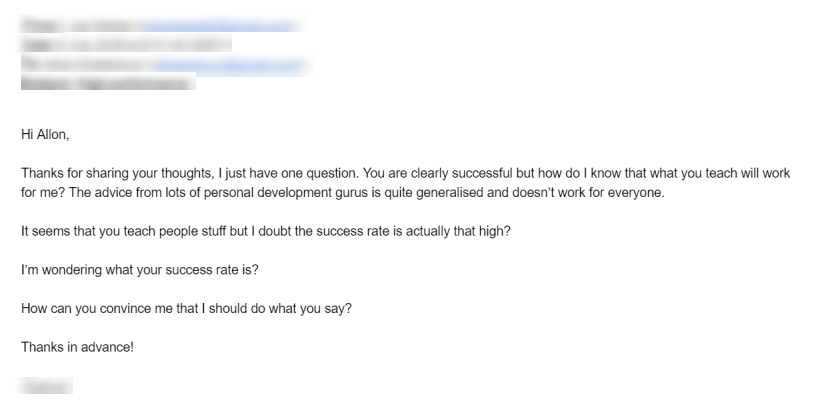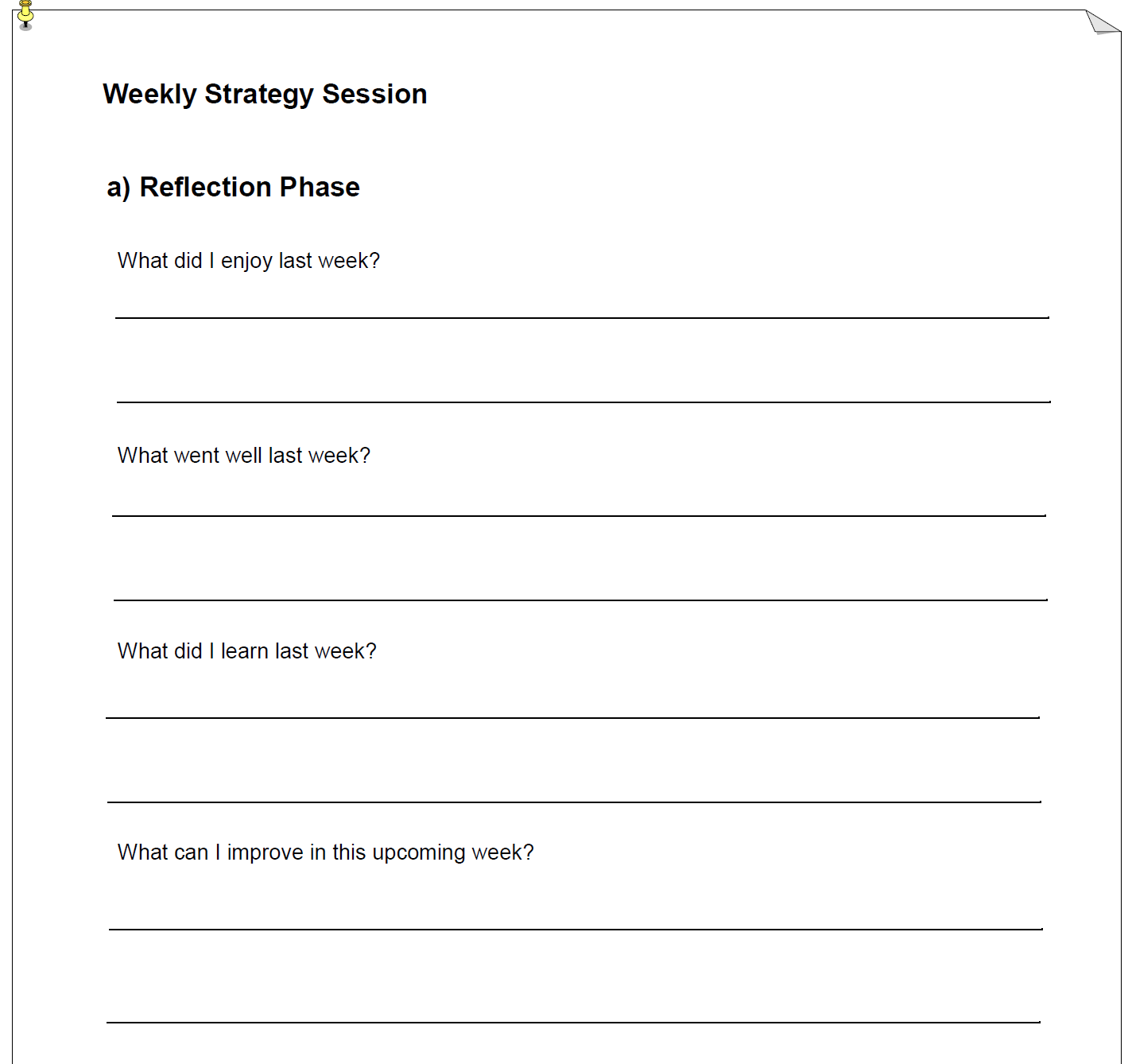
Scared to fail? 5 lies you tell yourself to get out of (finally) starting a real business
Three years ago, I made a decision:
I wanted to create an online business, and share with the world some of my insights from having managed world class athletes.
- I bought courses on how to create online courses.
- I took coaches who helped me create specific business action plans.
- I spoke to people who had launched successful online businesses.
In other words: I had all the resources to create my first product, and then gradually scale my business. Nevertheless, it was only in this year that I launched my first successful online course, Focus Like A World Class Athlete.
I made just under $6,922 and sold my course to 23 students.
I felt extremely excited and relieved but I couldn’t help but wonder:
Why did I need so long for my first successful launch?
Although I consider myself a high performance expert, I had some serious limiting scripts that kept preventing me from launching a successful online business. And I didn’t even notice them!
Today, I want to walk you through my five main limiting beliefs that stopped me from making a successful launch for so long, just in case you identified with my story.
- BELIEF #1: I am not good enough to teach others what to do.
- BELIEF #2: I will embarrass myself in front of existing clients, friends, and family.
- BELIEF #3: I don’t have time for any side business.
- BELIEF #4: If I fail my life will become a living disaster.
- BELIEF #5: I have nothing new to contribute that hasn’t already been covered by other experts.
Transforming your limiting beliefs may be your missing link to a successful launch, and I will now show you how to get rid of them so you can finally see the results you desire!
BELIEF #1: I am not good enough to teach others what to do.
When I started to think about launching my own online business, I felt extremely excited:
I knew that thanks to my experiences of managing some of the world’s best tennis players, I had been privileged with an insider view of what it takes to become a Top Performer, and why most people fail.

I also believed that my personal evolution from this awkward kid with learning disabilities to an adult who excelled academically and who successfully pursued his dream career would be very inspiring. I was convinced that all this, combined with my years of study of high performance, mental toughness, and personal development, made me a true expert in this field.
Yet I had serious doubts: Maybe I was not qualified to create my own products and teach people how they could improve their lives and adopt high performance habits?
After all, who was I to teach people around the world the secrets of high performance?
- I still didn’t earn a billion dollars myself.
- I don’t hold any world records.
- And I never filled up big stadiums with lectures on success principles.
To be honest, I wasn’t really aware of these limiting scripts, but without even noticing it, I continuously avoided positioning myself as a high performance expert.
For example, my initial business idea was to create products for dads who want to combine being successful with their business and being engaging and loving dads. It’s a great topic with a great market and clear burning pains.
I actually built a list of more than 5,000 people. But when I made my first launch for a product for business dads, guess what happened?
0 sales!
I started analyzing what happened and quickly noticed that the majority of my list were subscribers from the Philippines. How did that happen? I remembered I had delegated the task of building my list to my virtual assistant, which was a great example of me avoiding taking responsibility for my business.
One reason I did this was because I was not an expert in parenting, and this topic was not really aligned with my real passion. Instead, Business Dad was a way to hide away from positioning myself as a true high performance expert.
And I did this because I feared I was not good enough to help people become world class performers. Once I realized this, I switched ideas and started positioning myself as a high performance expert who would target online business owners. However, because of my insecurities, I continued to delay launches.
Now I know that I was scared as hell to teach people principles of success that I knew could transform their lives and their careers. This is why I kept delaying my launches.
Instead, I would spend hours learning more about how to create online business, about different themes related to high performance. And I would focus on introducing more high performance habits into my life.
I am not saying this learning was not valuable, but I wasn’t moving my new business idea forward. In my head, I had this belief that I would need to know absolutely everything about running an online business and about all the topics related to high performance. In fact, I even thought I would need to be a flawless role model.
Actually, it was quite ironic that I was struggling so much. High performance is all about growing and developing, and less about being perfect!
Gradually, my belief shifted from ‘’Who am I to teach high performance strategies to online business owners’’ to “I have an obligation to share my life experiences and expertise with as many people as possible.”
If you’re struggling with the limiting belief that you are not good enough to help others with their products and services, start helping people on a 1-1 basis and get as much feedback as you can on your work.
Once you do that, you will know whether you are ready for an online product, and you will have tons of feedback on how to structure it so you will give your future clients the best results.
Want to build a business that enables you to live YOUR Rich Life? Get my FREE guide on finding your first profitable idea.
BELIEF #2: I will embarrass myself in front of existing clients, friends, and family.
I was extremely motivated to launch a successful online business when I started to look into this project three years ago. I had just become a dad, and I thought this would be a great fit for my current lifestyle.
At the same time, I did everything I could to keep my dream a big secret.
- I avoided speaking to people from the sports world about my new online business.
- I didn’t try pitching guest posts to big sites.
- I kept away from speaking on podcasts.
- I didn’t promote my work on my own social media.
In other words, I didn’t tell friends and clients (I am still very hesitant about speaking about my online business and future ambitions), and was hoping to launch this million dollar business without promoting myself!
The reason was simple:
I was scared to embarrass myself!
Now, the fear of rejection is extremely powerful. We humans are social animals, and so being rejected or ridiculed from our social group traditionally meant loss of access to food, support, and finding mating partners. In other words, it would have been life-threatening.
This is why I kept postponing the meaningful work required for my online business and always found good reasons for doing so.
I also started self-justifying my inactions and subtle forms of self-sabotaging by telling myself:
- I am doing everything I can but it simply is not enough.
- Maybe I just don’t have any real value to offer people.
- And maybe I don’t even want to launch an online business.
The worst thing is I didn’t even know we have those thoughts.
As George Orwell famously said:
“We are all capable of believing things which we know to be untrue, and then, when we are finally proved wrong, impudently twisting the facts so as to show that we were right. Intellectually, it is possible to carry on this process for an indefinite time: the only check on it is that sooner or later a false belief bumps up against solid reality, usually on a battlefield.”
So there I was: working really hard, but without seeing any results. It felt like driving a car with one foot on the gas pedal and the other one on the brake.
I felt so frustrated that I knew I needed to stop hiding myself from my own business. I didn’t want to experience another launch with zero sales, so I decided to stop making excuses and accept that I would need to make mistakes on my way to launching a successful online business.
While I would do everything to avoid getting potential criticism from people in the past, I finally accepted that feedback would actually help me become more successful. And even though it was difficult at times, I started to encourage people to let me know how they liked my website, my blog posts, and anything else I created.
Of course, once we promote ourselves, people may be a bit harsh with their criticism, or even make fun of us, and this can make us feel a little embarrassed.
At the same time I can tell you from my experience that this fear is more inside our head than anywhere — so far I have not had a single bad experience yet.
What I discovered is that people actually love when we are courageous, when we share our own vulnerable story and some of the mistakes we have made. This is because most people do not want to learn from superheroes, but from real people who can relate to our daily struggles.

So I started to share real stories about myself.
For example, for the sales page and email campaign of my online course Focus Like A World Class AthleteI shared some very personal stories.
As a kid, I used to feel like an “ugly duckling”, I had motoric issues that kept making me nervously fiddle with my hands. I wore these super thick glasses that made my eyes much bigger and which made avoid looking into people’s eyes. And I started speaking at a very late age which made it difficult for me to really express myself like other kids. To make things worse: I was destined to go to a school for kids with special needs because at that early age I seemed to be suffering from learning disabilities.
And guess what happened:
People started seeing themselves in my stories, they started engaging, and they started buying my course.

What I am trying to say here is that becoming more vulnerable and sharing real life stories is the best antidote to fear of rejection. It takes off the burden of needing to be perfect. And it helps us build the psychological safety net that will allow us to make mistakes without feeling devastated.
BELIEF #3: I don’t have time for any side business.
If you haven’t launched your first product or service yet, it is very likely that you are busy with a day job. After all, you have bills to pay and people to take care of.
In my case, this meant running a tennis event in China, managing professional tennis players, and being part of the council of the governing body of professional tennis.

And I had a two-year-old toddler who wanted my attention.

So how do we find time for our online business? Initially I struggled with this, as I would sporadically work hard on moving forward with the modules of GrowthLab’s Zero to Launch, but take big breaks when things got busy.
To build momentum, you need to focus on consistent progress, and this requires that you give your business at least some time and attention.
This is how suddenly your email list will explode, your copywriting skills will improve, your sales campaigns will trigger unprecedented sales, and your content will become so good that people will know that you are a true expert!
One of the most powerful habits you can create, to really build momentum, is daily Powerblocks. For me, these are 55-minute sessions in which I work on one important creative task related to my online business, free from distractions. This might mean writing a blog post, developing an online course, or sketching out a sales campaign.
Let me share with you the key steps that helped me create my first product and launch it successfully, despite my busy schedule:
- I set a date for a launch. If you haven’t done this, commit to launching something within the next three months!
- I worked backward and defined milestones. This meant setting monthly benchmarks and then setting weekly goals.
- I scheduled daily Powerblocks in which I would focus on one activity only related to making a successful launch. While this sounds good, it will only work if you literally schedule Powerblocks into your schedule as you would schedule any other important meeting or commitment.
- I tracked my progress on a weekly basis. I recommend that every Friday you sit down, analyze whether you are moving towards your weekly goals, and what you can improve for the upcoming week.

- I hired a coach who would support me and hold me accountable. While Zero To Launch is great, you will save time with real human support.
BELIEF #4: If I fail my life will become a living disaster.
If you follow the story of the Top Performers in the world, you will see that it does not matter if you are tracking an entrepreneur, an athlete, or a business leader, they all have one thing in common.
They suffered major setbacks, but used them to get stronger and better. The problem is most of us exaggerate the consequences of setbacks:
We picture ourselves going bankrupt, losing our partner, and being expelled to a lonely island. Luckily, this is usually not the case, especially when we focus on learning and growing.
However, we can spin it as we want. Failures are painful, and you won’t enjoy them, unless you really embrace the fact that they can help you improve. In his book Principles: Life and Work, Ray Dalio gives us his formula for success:
Success = pain + reflection
The question is, how can we minimize this pain and maximize the reflection?
Most people will magnify disappointments, minimize successes, and make up stories that will scare them to death. But negativity triggers the kind of tunnel vision that will stop us from finding creative solutions, making our situation feel even more hopeless.
Top Performers need to do the opposite. They need to process disappointments quickly, learn what they can, and move on. And they must feed off successes and use them as a means to build unshakable confidence.
Let me show you how I do this:
I magnify my successes: For example, I saw my launch as a huge event, although I had done much bigger deals in the past. The reason this launch was so significant was because it showed me that I was on the right track, and if I could help 25 people with my product, I would be able to help many more in the future. To celebrate my success, I decided to take my wife on a kids-free vacation.
I minimize disappointments: When I first built my list, I quickly had 5k people. I was super excited. At the same time, I barely had any engagement. It took me time to discover that I wasn’t focusing on attracting people who really match my target audience. I used this setback as an opportunity to learn.
I make up empowering stories: My new story is that if I can sell one product I can sell a million products, provided I focus on adding real value and really understanding the dreams, desires, and burning pains of my audience. I also know that every launch is a test that will reveal what works and what needs to be improved.
BELIEF #5: I have nothing new to contribute that hasn’t already been covered by other experts.
There are so many experts on high performance, like Tony Robbins, Jim Loehr, and Brendon Burchard.
This begs the question: How can I contribute?
Initially, this belief kept holding me back from launching my online business and my first product. I kept comparing myself to these people who have millions of fans, hundreds of products, and who have seemingly covered every angle of personal development and high performance.
But over time, I realized that comparing myself was pointless.
First of all, I have my unique angle and unique story, being this awkward kid who dreamed of becoming a sports agent. I also had this remarkable opportunity to witness young tennis players come from nowhere and then become leading forces of their sport.
All I needed to do was authentically share these stories and experiences. If you think about it, you will find your own stories and experiences that are unique as well.
Second, I also noticed that we do not need to reinvent the wheel.
There are certain business — and even high performance — principles that work and that have already been shared for hundreds of years. The key is to create our own style and our own personal frameworks with which we explain concepts related to our expertise.
And to do this, we need to focus on gaining a deep understanding of the leading authorities within our industry, so we can create our own frameworks, and then test them out to see what works, what needs tweaking, and what we can share with clients.
And finally: I realized I had to focus on giving my clients results.
So many online courses promise the world, but only a very minor percentage of people get the results they desire.
And this is where I wanted to be different.
My focus would be on giving customers all the support needed so they would experience breakthrough results.
Here are a few things I did to give my students everything they needed:
- Instead of automating my course, I created modules that consist of live classes on Zoom and they can ask me questions throughout my presentation.
- I offered lots of Q and A opportunities for every student.
- I shared personal stories and stories from the world of sport.
- I created a Facebook group in which each student had their own thread in which they could track their progress, ask questions, and get support from others.
- I offered 1-1 sessions with me as a special bonus.
To ensure my clients get the results they desire, I now actively seek feedback! I know this is how I will create remarkable products and serve more people who wish to become true high performers. ***
So these are the 5 beliefs I had to overcome to finally launch my product.
I know that I have not eliminated them totally, and that they will keep trying to enter my life through the back door. At the same time, my first launch has helped me understand that I have a choice about how I see myself, my business, and my customers, and that it is my responsibility to create the kind of beliefs that will allow me to take bold action.
So how can you know if you have limiting beliefs that are preventing you from launching an online course?
Start by asking yourself these two questions:
- Do you have an area of expertise?
- Do you know the steps you need to take to launch a successful product because you read the stories of other entrepreneurs, bought proven courses, or even have the support of a coach?
If you answered yes to both, but you haven’t launched yet, it is quite likely that limiting beliefs are holding you back.
So take a moment, slow down your thinking, and start noticing the stories that are preventing you from sharing your message around the world.
Once you do that, please share with me the #1 belief that comes up, right now in the comment section, and let’s see how we can reframe it together.
I will be reading all the comments and look forward to giving you my feedback!
This is how suddenly your email list will explode, your copywriting skills will improve, your sales campaigns will trigger unprecedented sales, and your content will become so good that people will know that you’re.



